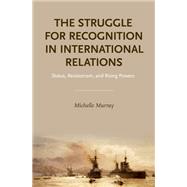The Struggle for Recognition in International Relations Status, Revisionism, and Rising Powers
, by Murray, Michelle- ISBN: 9780190878900 | 0190878908
- Cover: Hardcover
- Copyright: 12/5/2018
How can established powers manage the peaceful rise of new great powers? With The Struggle for Recognition in International Relations, Michelle Murray offers a new answer to this perennial question in international relations, arguing that power transitions are principally social phenomena whereby rising powers struggle to obtain recognition as world powers. At the center of great power identity formation is the acquisition of particular symbolic capabilities-such as battleships, aircraft carriers or nuclear weapons-that are representative of great power status and which allow rising powers to experience their uncertain social status as a brute fact. When a rising power is recognized, this power acquisition is considered legitimate and its status in the international order secured, leading to a peaceful power transition. If a rising power is misrecognized, its assertive foreign policy is perceived to be for revisionist purposes, which must be contained by the established powers. Revisionism-rather than the product of a material power structure that encourages aggression or domestic political struggles-is a social construct that emerges through a rising power's social interactions with the established powers as it attempts to gain recognition of its identity.
To highlight the explanatory reach of the argument, Murray compares the United States and Imperial Germany's contemporaneous rise to world power status at the turn of the twentieth century. Whereas successful acts of recognition constructed American expansionism as legitimate thereby facilitating its peaceful rise, ongoing misrecognition increased German status insecurity, constructing it as a revisionist threat to the international order.
The question of peaceful power transition has taken on increased salience in recent years with the emergence of China as an economic and military rival of the United States. Highlighting the social dynamics of power transitions, The Struggle for Recognition in International Relations offers a powerful new framework through which to understand the rise of China and how the United States can facilitate its peaceful rise.
To highlight the explanatory reach of the argument, Murray compares the United States and Imperial Germany's contemporaneous rise to world power status at the turn of the twentieth century. Whereas successful acts of recognition constructed American expansionism as legitimate thereby facilitating its peaceful rise, ongoing misrecognition increased German status insecurity, constructing it as a revisionist threat to the international order.
The question of peaceful power transition has taken on increased salience in recent years with the emergence of China as an economic and military rival of the United States. Highlighting the social dynamics of power transitions, The Struggle for Recognition in International Relations offers a powerful new framework through which to understand the rise of China and how the United States can facilitate its peaceful rise.






